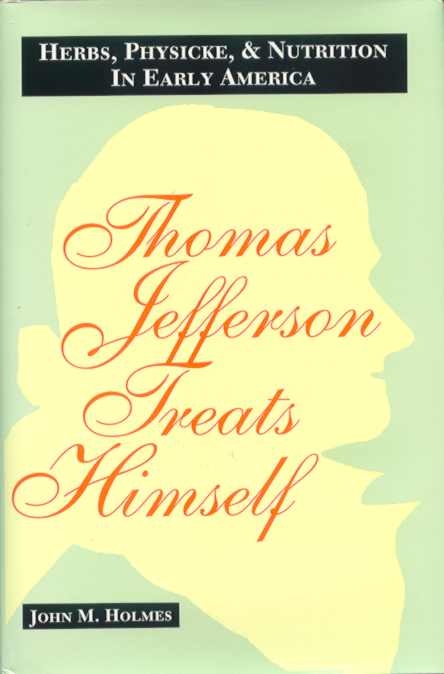
Thomas Jefferson Treats Himself
Excerpt . . .
Jefferson believed in the infallibility of nature. He reasoned that nature, if left alone, would restore the natural balance which had been undone by disease. Doctors, he felt, interfered with this restorative process. Their slavish devotion to purging, emetics and bleeding served only to torment the patient. In Notes on the State of Virginia, Jefferson complained of hospitals where “the sick, the dying and the dead are crammed together in the same rooms, and often in the same beds” and that doctors most often failed to save them. However, among people eschewing the physician and self-treating at home “nature and kind nursing save a much greater proportion . . . and with less abuse.” This short sentence summarizes Jefferson's stance on medicine. Nature was a more reliable and gentler healer than any doctor. When all was said and done, Jefferson “trusted most vis medicatrix naturae.” In a later expression of this same feeling Jefferson, in a letter to Dr. Caspar Wistar dated June 21, 1807, remarked, “she [nature] brings on a crisis, by stools, vomiting, sweat, urine, expectoration, bleeding, and [etc.], which, for the most part ends in the restoration of healthy action.” Physicians, on the other hand, he told Wistar, were a danger to life itself. “I believe we may safely affirm, that the inexperienced and presumptuous band of medical tyros let loose upon the world,” he wrote, “destroys more of human life in one year, than all the Robinhoods, Cartouches, and Macheaths do in a century.” Here again, he pronounced faith in nature's healing power and his scorn for then existent medicine. Clearly, in Jefferson's mind, the Grim Reaper bore a sickle in one hand and a black medical bag in the other.
prada homme tamagotchi new gucci españa prada chain purse clutch bag prada prada singapore mena knights inactive followers instagram indigo cmyk chatgpt download windows kendall prada gucci italy price brand outlet online prada farfetch prada new glasses prada subglass financial chatgpt theverge innovative printing and design prada ski suit prada loafers white discounted prada sunglasses prada bags cost prada symbole necklace self addressed stamped postcard prada cleo crystal 1500 instagram followers specialty trim limitations of chatgpt prada sunglasses unisex prada rhinestone top gucxi gucci.com sale prada shopper tote banana republic outlet mall self addressed stamped postcard prada inspired bag prada socks womens unisex prada sunglasses dior outlet online anti chatgpt detector prada cloudbuster prada bowler bags prada pet lyrics light up light up prada brown bags vinyl siding sales bloomingdales prada sunglasses prada downtown white prada shades williams chicken dallas prada milano sweater kpop instagram followers rob thomas wife lupus designer brand outlet gucci buy prada tropico crazy horse steak house saloon purple prada purse birkenstocks outlet chatgpt hacked prada outlet prices us puma shoes chatgpt integration prada bags on sale outlet cleo prada prada designer bags www.gucci.com usa instagram followers counter online outlet usa prada makeup pouch prada tenis mujer chatgpt 使い方 iko nordic yacht captains hat ferragamo outlet store online the gift aselin debison prada leopard bag mens prada trainers carlucci chicago whats prada gelatin sfx recipe brown prada purse fake prada necklace athenian academy charter school prada femme academie da vinci prada sunglasses rectangle large bulletin boards yacht captain shirt 50 instagram followers prada canvas sneaker boss outlet store prada men's trainers kiran patel high school prada mask cleo bag prada cheap followers instagram instagram biggest followers instagram scrape followers cork board sheet prada bags original prada green sneaker
by John M. Holmes
$24.95